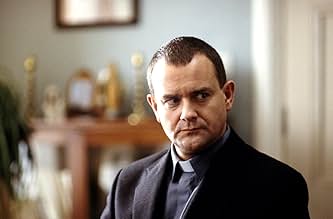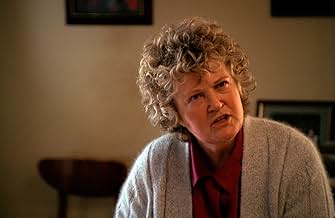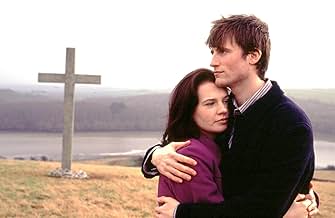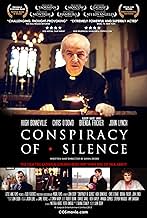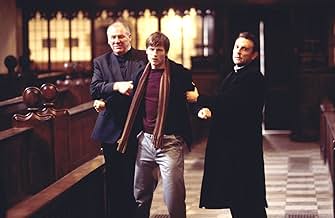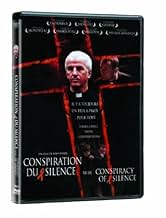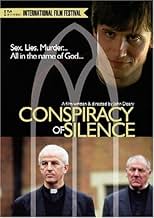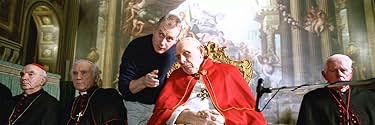अपनी भाषा में प्लॉट जोड़ेंA Catholic priest's suicide and seminarian's expulsion for homosexuality spark a local journalist's investigation, uncovering celibacy controversies and abuse cover-ups within the Irish Cath... सभी पढ़ेंA Catholic priest's suicide and seminarian's expulsion for homosexuality spark a local journalist's investigation, uncovering celibacy controversies and abuse cover-ups within the Irish Catholic church.A Catholic priest's suicide and seminarian's expulsion for homosexuality spark a local journalist's investigation, uncovering celibacy controversies and abuse cover-ups within the Irish Catholic church.
- पुरस्कार
- 2 जीत और कुल 3 नामांकन
Padraig O'Loinsigh
- Father Sweeney
- (as Patrick Lynch)
फ़ीचर्ड समीक्षाएं
I saw this film on holiday in Galway. It was a headliner at the Galway Film Fleadh. The experience was rather surreal because most of the starring cast were present for the premiere.
John Deery examines the question of celibacy in the Catholic church with pride and skepticism. The viewer doesn't quite know which side he stands on, but he is clearly a devout Catholic as well as a fighter for a more just way of treating priests. Although a much less controversial treatment, this film is in the same vein as 1994's Priest. This film may be a little more universal and pleasing to one's own beliefs, though.
Actors Jonathan Forbes and Brenda Fricker have many pointed moments together on screen, but frankly that should come as no surprise. After all, what has Brenda Fricker ever been in that has been bad? All of the other actors do a fine job, as well.
I recommend that if you come across a screening of this film, to see it...especially if you are Catholic. If not, rent it.
John Deery examines the question of celibacy in the Catholic church with pride and skepticism. The viewer doesn't quite know which side he stands on, but he is clearly a devout Catholic as well as a fighter for a more just way of treating priests. Although a much less controversial treatment, this film is in the same vein as 1994's Priest. This film may be a little more universal and pleasing to one's own beliefs, though.
Actors Jonathan Forbes and Brenda Fricker have many pointed moments together on screen, but frankly that should come as no surprise. After all, what has Brenda Fricker ever been in that has been bad? All of the other actors do a fine job, as well.
I recommend that if you come across a screening of this film, to see it...especially if you are Catholic. If not, rent it.
Watched this film in 2010 on DVD on a rainy Friday evening in October - so this was ideal although sombre entertainment.
The film has a reasonably fast pace, a simple story line - a little preachy in its anti-celibacy message, but overall worthwhile, although the ending is a bit implausible.
It seems somewhat unrealistic that a seminary in today's Ireland would still exist with more than half a dozen trainees, and hard to believe that with such low numbers that they would so quickly expel a trainee without evidence. The film was made in 2003 before the onslaught of the fallout of the Catholic-Church-Protects-Paedophiles scandals, and to see the movie again in the knowledge of such events gives an added frisson - "the church is killing itself from the inside" is one of the quotes from the film.
The storyline involves celibate priests that are gay - it could just as easily have portrayed priests or bishops that have one or more children - but perhaps the movie had an agenda that was more than just anti-celibacy but also against the anti-gay homophobic nature of the roman-catholic hierarchy.
The film shows a statistic about 100,000 priests having quit because of the celibacy rule - but does'not show the numbers of priests in non-catholic Christian traditions who can marry but still leave their ministries anyway.
For a non-Irish audience some of the accents are difficult, and my DVD did not have a sub-title track for some reason.
A worthy film, if a little flawed, hope to see more from this director.
The film has a reasonably fast pace, a simple story line - a little preachy in its anti-celibacy message, but overall worthwhile, although the ending is a bit implausible.
It seems somewhat unrealistic that a seminary in today's Ireland would still exist with more than half a dozen trainees, and hard to believe that with such low numbers that they would so quickly expel a trainee without evidence. The film was made in 2003 before the onslaught of the fallout of the Catholic-Church-Protects-Paedophiles scandals, and to see the movie again in the knowledge of such events gives an added frisson - "the church is killing itself from the inside" is one of the quotes from the film.
The storyline involves celibate priests that are gay - it could just as easily have portrayed priests or bishops that have one or more children - but perhaps the movie had an agenda that was more than just anti-celibacy but also against the anti-gay homophobic nature of the roman-catholic hierarchy.
The film shows a statistic about 100,000 priests having quit because of the celibacy rule - but does'not show the numbers of priests in non-catholic Christian traditions who can marry but still leave their ministries anyway.
For a non-Irish audience some of the accents are difficult, and my DVD did not have a sub-title track for some reason.
A worthy film, if a little flawed, hope to see more from this director.
CONSPIRACY OF SILENCE is a moody, dark, probing inquiry into the concept of celibacy of priests in the Catholic Church in Ireland and all the way to the Vatican. The concept, story and script by Writer/Director John Deery are tight, arrow sharp in aim, but ultimately unresolved issues cloud the success of what could have been a pungent movie.
Set in a seminary in Ireland for preparing young men for the priesthood, we are introduced to some warmly human characters such as Daniel McLaughlin (Jonathan Forbes), a squeaky clean lad who gave up a girlfriend Sinead (Catherine Walker) to follow his (and his family's) life ambition to become a priest. Naive, warm, loving, athletic and bright, he is the seminary poster boy - until one evening after hours he innocently visits a fellow seminarian's room and is the focus of seduction by the student who kindly says 'we're all only human and have our needs'. Daniel gently declines the advances, leaves the student's room but is observed by an old priest with demons of his own. The priest reports the incident and Daniel is abruptly thrown out of the seminary by the evil Rector Cathal (Sean McGinley) for being homosexual - a charge that couldn't be farther from the truth.
At the same time in another part of the seminary the fine Father Sweeney dresses in all his priestly regalia and commits suicide is a gruesome way. His suicide is threatening to the staff of the seminary and a cover-up is immediately put in place. It seems Father Sweeney some four years ago had stirred controversy in the Vatican by publicly exposing his HIV status, alerting the Church and the world that HIV was rampant in the world wide Church. His partner left the priesthood, disillusioned, but following FR Sweeney to the seminary in Ireland.
An earnest reporter David Foley (Jason Barry) begins the investigation of the suicide and in doing so finds the reason for Daniel's expulsion as well as the myriad dark secrets being covered by the Church - all to do with the concept of celibacy and the inevitable sequelae of sensual deprivation on priests. One Father Jack Dowling (Hugh Bonneville) supports David and Daniel and is disenchanted with the behavior of the Church against its own priests. Then, without resolving any of these fascinating strings of thought the movie ends, leaving many questions unanswered - as though there are no answers.
The acting is uniformly strong (including the likes of Brenda Fricker as Daniel's mother et al), for once giving a spectrum of the priesthood that is not favoring bad or good. These characters are men with convictions and none can be faulted for their stances. The setting in Ireland is magnificently captured by cinematographer Jason Lehel, and Francis Haines and Stephen W. Parsons provide a hauntingly beautiful musical score. As far as it takes us this is a fine film. Perhaps Deery is planning Part II to finish this story! Grady Harp
Set in a seminary in Ireland for preparing young men for the priesthood, we are introduced to some warmly human characters such as Daniel McLaughlin (Jonathan Forbes), a squeaky clean lad who gave up a girlfriend Sinead (Catherine Walker) to follow his (and his family's) life ambition to become a priest. Naive, warm, loving, athletic and bright, he is the seminary poster boy - until one evening after hours he innocently visits a fellow seminarian's room and is the focus of seduction by the student who kindly says 'we're all only human and have our needs'. Daniel gently declines the advances, leaves the student's room but is observed by an old priest with demons of his own. The priest reports the incident and Daniel is abruptly thrown out of the seminary by the evil Rector Cathal (Sean McGinley) for being homosexual - a charge that couldn't be farther from the truth.
At the same time in another part of the seminary the fine Father Sweeney dresses in all his priestly regalia and commits suicide is a gruesome way. His suicide is threatening to the staff of the seminary and a cover-up is immediately put in place. It seems Father Sweeney some four years ago had stirred controversy in the Vatican by publicly exposing his HIV status, alerting the Church and the world that HIV was rampant in the world wide Church. His partner left the priesthood, disillusioned, but following FR Sweeney to the seminary in Ireland.
An earnest reporter David Foley (Jason Barry) begins the investigation of the suicide and in doing so finds the reason for Daniel's expulsion as well as the myriad dark secrets being covered by the Church - all to do with the concept of celibacy and the inevitable sequelae of sensual deprivation on priests. One Father Jack Dowling (Hugh Bonneville) supports David and Daniel and is disenchanted with the behavior of the Church against its own priests. Then, without resolving any of these fascinating strings of thought the movie ends, leaving many questions unanswered - as though there are no answers.
The acting is uniformly strong (including the likes of Brenda Fricker as Daniel's mother et al), for once giving a spectrum of the priesthood that is not favoring bad or good. These characters are men with convictions and none can be faulted for their stances. The setting in Ireland is magnificently captured by cinematographer Jason Lehel, and Francis Haines and Stephen W. Parsons provide a hauntingly beautiful musical score. As far as it takes us this is a fine film. Perhaps Deery is planning Part II to finish this story! Grady Harp
First of all, I would like to comment on that review that characterized the maker of this movie as "a devout Catholic." Perhaps he is, but you'd never know it from this movie. Authority and obedience are portrayed as outdated and inflexible rituals rather than, as the Church teaches, a MEANS to the end: a moral life and therefore a good death. No, in this puff piece, "rights" and revolt are the safeguards of Christian moral teachings.
It's a real shame, too, because I was really hopeful that someone had finally done a piece about the general crisis in the priesthood without either whitewashing the depth and the gravity of the problem (as do most so-called "conservative" dupes) or calling for a radicalization of immutable Catholic doctrine and its underlying philosophy (as pretty much every run-of-the-mill left-liberal idiot in the "mainstream" media has done). There have been many bishops who have abused their authority and many priests who have done terrible things. And there is a serious accountability problem.
It's also a shame that a film with such high production value - very good directing and acting - had a script that falls back time and again on salacious voyeurism and trite contemporary banalities such as "I have a right to be here!" But there is one good didactic thing to take away from that moment. For a Catholic, to see a young seminarian protest so and then his seminary director reply coldly, "Not in here, you don't" is as much a sad reflection of the failing of the director as it is a pathetic portrait of the young man's effeminacy: why did the director not make it a point to emphasize the virtue of obedience to his seminarians first thing and thereby avoid having to hear them spit out such false nonsense? Why and how did he fail to establish a relationship of trust with them? The film never explores those questions.
And please, before anyone tries to give me the answer I think you're thinking, let me ask: how would "change" in the Church, through a more "liberal" and "democratic" ecclesiastical government, make the people more trusting of Church leaders? (Consider that the democratically elected U.S. Congress is one of the least-respected institutions in its country.)
It's a real shame, too, because I was really hopeful that someone had finally done a piece about the general crisis in the priesthood without either whitewashing the depth and the gravity of the problem (as do most so-called "conservative" dupes) or calling for a radicalization of immutable Catholic doctrine and its underlying philosophy (as pretty much every run-of-the-mill left-liberal idiot in the "mainstream" media has done). There have been many bishops who have abused their authority and many priests who have done terrible things. And there is a serious accountability problem.
It's also a shame that a film with such high production value - very good directing and acting - had a script that falls back time and again on salacious voyeurism and trite contemporary banalities such as "I have a right to be here!" But there is one good didactic thing to take away from that moment. For a Catholic, to see a young seminarian protest so and then his seminary director reply coldly, "Not in here, you don't" is as much a sad reflection of the failing of the director as it is a pathetic portrait of the young man's effeminacy: why did the director not make it a point to emphasize the virtue of obedience to his seminarians first thing and thereby avoid having to hear them spit out such false nonsense? Why and how did he fail to establish a relationship of trust with them? The film never explores those questions.
And please, before anyone tries to give me the answer I think you're thinking, let me ask: how would "change" in the Church, through a more "liberal" and "democratic" ecclesiastical government, make the people more trusting of Church leaders? (Consider that the democratically elected U.S. Congress is one of the least-respected institutions in its country.)
I was lucky enough to be invited to a cast screening of the film at the Empire in Leicester Square, (my dad has a small part - he sings the Wild Colonial Boy in a pub scene). I really enjoyed the film as it struck a number of chords with me having been brought up a Catholic, taught by priests and Irish (at least Irish descent). The film has the same well observed quality as Alan Parkers film of Roddy Doyle's The Committments. The topic is a serious one about Aids and Homosexuality in the Catholic Church but don't let that put you off, the film is full of funny interactions that are typically Irish and will appeal to many people. I didn't think that the message of the film was clear it covered the Church's attitude to aids, homosexuality, harshness of the regime in a seminar and corruption. So something for everyone. A well acted and entertaining film with a number of well known stars in fairly minor roles.
क्या आपको पता है
- ट्रिवियाThe team sport discussed and then played in the early part of the film is Hurling. Hurling (Irish: Iománaíocht/Iomáint), one of Ireland's native Gaelic games. Hurling is an outdoor team game of ancient Gaelic origin, administered in Ireland by the Gaelic Athletic Association. The game has ancient origins, and is known to have been played for over 3,000 years. In some ways similar to the North American game of Lacrosse, in terms of game play, both are often touted as the world's fastest team field game.
- भाव
Daniel McLaughlin: Ya, I was celibate... from the moment I joined the seminary... until last night.
- साउंडट्रैकAll I Want Is You
Written by Bono ( as Hewson), Adam Clayton (as Clayton),The Edge (as Evans), Larry Mullen Jr. (as Mullen)
Used by permission of Blue Mountain Music Ltd/Rykomusic Ltd
Performed by Bellefire
Licensed by courtesy of Virgin Records Limited
टॉप पसंद
रेटिंग देने के लिए साइन-इन करें और वैयक्तिकृत सुझावों के लिए वॉचलिस्ट करें
- How long is Conspiracy of Silence?Alexa द्वारा संचालित
विवरण
- रिलीज़ की तारीख़
- कंट्री ऑफ़ ओरिजिन
- आधिकारिक साइटें
- भाषा
- इस रूप में भी जाना जाता है
- Zmowa milczenia
- फ़िल्माने की जगहें
- Callington, Cornwall, इंग्लैंड, यूनाइटेड किंगडम(Film used in town shots)
- उत्पादन कंपनियां
- IMDbPro पर और कंपनी क्रेडिट देखें
बॉक्स ऑफ़िस
- बजट
- $30,00,000(अनुमानित)
- US और कनाडा में सकल
- $2,598
- US और कनाडा में पहले सप्ताह में कुल कमाई
- $2,598
- 5 दिस॰ 2004
- दुनिया भर में सकल
- $2,598
- चलने की अवधि
- 1 घं 30 मि(90 min)
- रंग
- ध्वनि मिश्रण
- पक्ष अनुपात
- 1.85 : 1
इस पेज में योगदान दें
किसी बदलाव का सुझाव दें या अनुपलब्ध कॉन्टेंट जोड़ें


